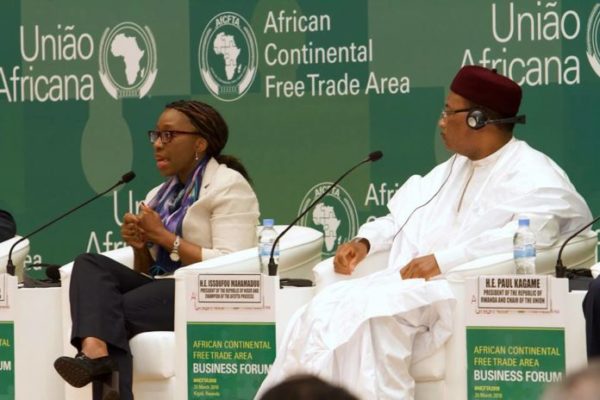“With the signing of the Kigali Declaration for the launch of the African Continental Free Trade Area, Africa has taken a giant step towards continental integration, the pan-African vision and the development of our continent,” he said. Vera Songwe, Executive Secretary of ECA. Speaking at the official signing of the ZLECA today in Kigali, Ms. Songwe noted that this historic moment demonstrates the determination of African leaders to bring together the diversity of the continent and materialize this flagship project of Agenda 2063. of the African Union. She thanked all UN agencies for their support and affirmed that ECA was “honored to be associated with this historic moment”.
At the 18th Extraordinary Session of the African Union Summit held in Kigali on March 21st, 44 African countries signed the ZLECA, while a total of 50 countries signed the Kigali Accord or Declaration, affirming their commitment to implement this agreement, which aims to double intra-African trade by removing non-tariff and tariff barriers on goods and services. In addition, 27 countries have also signed the African Union Protocol on the Free Movement of Persons, which complements the ZLECA by providing for the abolition of visas, the right of residence, the right to do business for nationals of signatory countries. and to create professional institutions.
In his address, Rwandan President Paul Kagame, who chairs the African Union, said that “the ZLECA was the culmination of a vision set out almost 40 years ago in the Lagos Plan of Action, adopted in 1980 “, a single market at the continental level. He also recognized the leading role of the regional economic communities in promoting African integration.
For his part, Moussa Faki Mahamat, Chairperson of the African Union Commission, thanked ECA for its support during the two years of negotiations. He added, “The giant Africa can not wake up if the continent is divided. We must hasten the pace, because international competition leaves no room for the weak. He called on the Member States to also sign the Protocol on Free Movement of Persons, which should lead to the creation of an African passport.
The ECA Executive Secretary also urged member states to ratify the ZLECA swiftly, recalling that the agreement would only enter into force after ratification by a sufficient number of countries.
Likewise, the ECA leader said the signing of the ZLECA marked only the end of the first phase of the negotiations, stressing the need for effective implementation. The ZLECA Business Country Index, launched by ECA at the Summit, will be one of the monitoring tools, through periodic surveys of business opinions about the real impact of the agreement on trade.
Vera Songwe also reaffirmed the need to leave no one behind as part of the Sustainable Development Goals, ensuring that everyone can benefit from the new opportunities created by the ZLECA.
According to ECA, among the main beneficiaries will be small and medium-sized enterprises, which account for 80% of enterprises in the region; women, who make up 70% of informal cross-border traders; and young people, who should take advantage of new job opportunities.
ECA estimates that the ZLECA has the potential to increase intra-African trade by 52.3% by eliminating tariff barriers and doubling the volume of trade if non-tariff barriers are also lifted.



